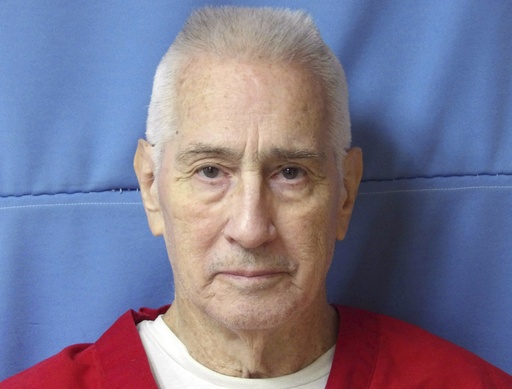PARCHMAN, Miss. — On Wednesday, Mississippi executed the longest-serving individual on its death row, Richard Gerald Jordan, who had been convicted nearly 50 years ago for the kidnapping and murder of a bank loan officer’s wife as part of a ransom plot.
At the age of 79, Jordan, a Vietnam veteran suffering from post-traumatic stress disorder, was administered lethal injection at the Mississippi State Penitentiary in Parchman after his final legal appeals were dismissed by the U.S. Supreme Court. His death sentence, initially handed down in 1976, stemmed from the kidnapping and murder of Edwina Marter. The execution process began at 6 p.m. and Jordan was declared dead at 6:16 p.m.
Jordan had been among several Mississippi death row inmates who challenged the state’s three-drug execution method, arguing it was cruel and inhumane. Given a chance to speak before his execution, Jordan expressed gratitude for what he described as a humane process and extended apologies to the victim’s family, while also thanking his legal team and wife. His final remarks included a request for forgiveness and a vow to reunite spiritually.
Marsha Jordan, Richard’s wife, alongside his attorney Krissy Nobile and the Rev. Tim Murphy, a spiritual adviser, witnessed the execution from the viewing area, shedding tears during the procedure.
Following the execution, a representative for Marter’s family, Keith Degruy, read a statement on their behalf during a press conference. The statement emphasized that nothing could restore what was lost due to Jordan’s actions nearly half a century ago, and criticized his efforts to have his sentence altered in order to serve life in prison instead.
Jordan’s execution marked Mississippi’s third in the past decade, the preceding one having taken place in December 2022. This event followed closely after an execution in Florida and occurs during a year poised to see the highest number of executions since 2015.
According to Mississippi Supreme Court records, in January 1976, Jordan had phoned Gulf National Bank, seeking to speak with a loan officer, Charles Marter. Subsequently, he located the Marters’ home address in a phone directory and abducted Edwina Marter. He ultimately killed her in a wooded area before contacting her husband with a false assurance of her safety while demanding a $25,000 ransom.
Eric Marter, Edwina’s son, was only 11 at the time of the crime. Prior to the execution, he expressed to the media that it was overdue and that justice should prevail over doubt.
At the start of the year, Jordan was one of 22 individuals from the 1970s still awaiting execution, per records from the Death Penalty Information Center. This execution brought closure to an extensive legal battle encompassing four trials and numerous appeals. The Supreme Court had just recently dismissed a petition that asserted a breach of Jordan’s due process rights.
Krissy Nobile, who advocated for Jordan, highlighted that he was denied an independent mental health evaluation, which could have played a crucial role in his defense, particularly relating to his Vietnam war experiences. A clemency petition to Gov. Tate Reeves, citing Jordan’s PTSD from consecutive military tours, was rejected.
Franklin Rosenblatt, who supported the clemency plea, noted the evolving understanding of war trauma, underscoring its potential impact on behavior. However, Eric Marter refuted this perspective, attributing Jordan’s actions solely to financial motives, dismissing any extenuating war-related explanations.


